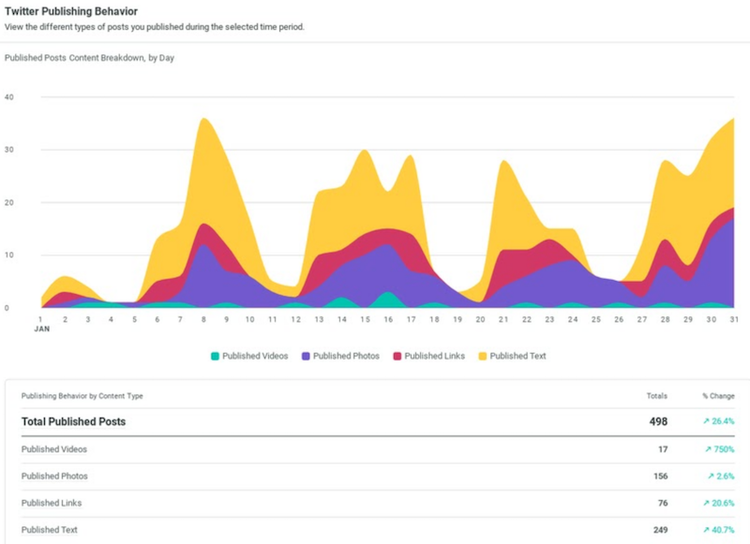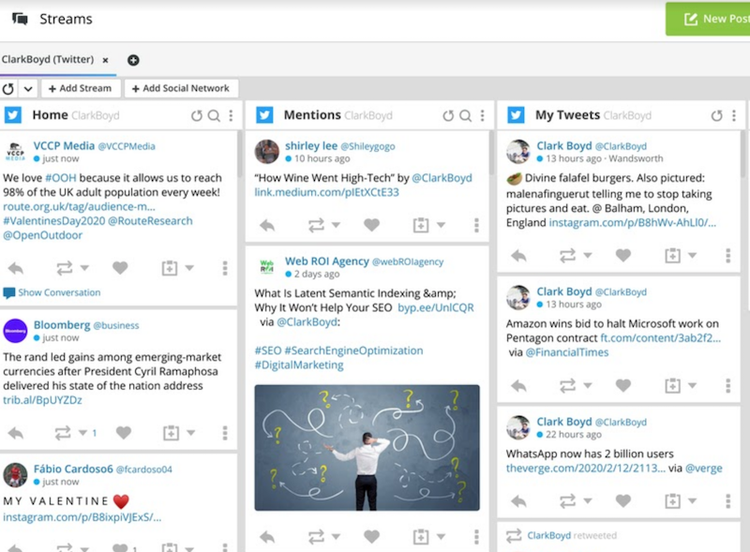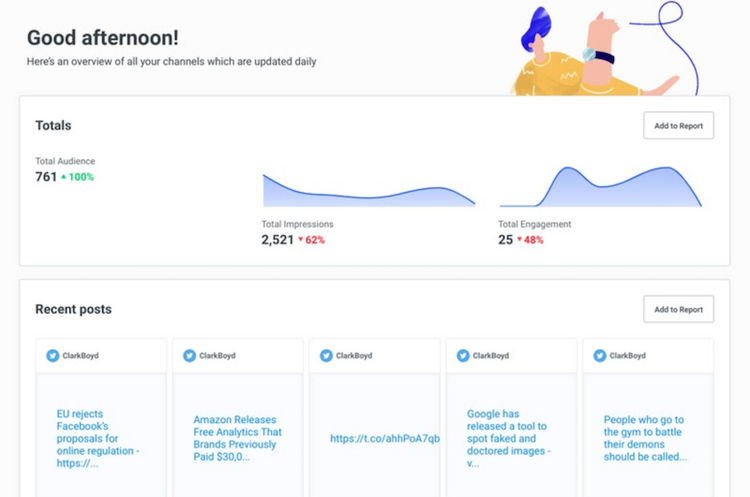3 Social Media Strategies to Use for Your Real Estate Business
Social media sounds like such a great place to do your marketing -- it’s free, and your clients are already out there using it.
But many professionals struggle with it; realtors create accounts and post occasionally, but when they fail to get traction they give up and focus on referrals and other types of marketing. But that's a mistake.
If you're not using social media, you're at a disadvantage, because your competitors probably are. A recent study found that 77% of realtors use social media in some way, and 99% of millennials start searching for a home online rather than through in-person referrals.
Social media for small businesses is challenging, but it's a must if you want to build a brand that will make you first in the minds of people looking to buy a home in your market. The following real estate marketing ideas will put social media to work for you.
Why should you use social media for your real estate business?
Being a successful real estate agent is all about building your brand, and one of the biggest benefits of social media is that it is ideally suited for doing just that.
But social media for realtors doesn't just increase brand visibility -- it also makes it easier to network, which is another critical aspect of selling in real estate.
With social media, real estate agents can share homes on the market, connect with existing and former customers, and ask for referrals. You shouldn't rely on social media entirely, but it is another tool in the small business marketing toolbox.
What social media tools are best for real estate marketing?
You have a lot of options for what social media platforms to use when promoting your brand, but there are four in particular that you should focus on.
1. Facebook
The social media landscape has changed a lot over the years, but Facebook remains the king when it comes to real estate. A Facebook business page is a must for realtors, not just because of the capabilities of the platform itself, but also who's on it.
Teens and young adults prefer platforms like Snapchat and Instagram, leaving the older generations -- in other words, people more capable of buying a home -- as the main audience on Facebook.
You simply cannot neglect Facebook as a realtor if you want to build that oh-so-critical network. It’s so important, in fact, that you should consider advertising on Facebook to connect with more potential clients.
Facebook best practices for real estate:
- Respond to comments to increase engagement
- Be generous with photos and video
- Keep it locally focused
2. LinkedIn
LinkedIn is another strong platform for real estate, again because of demographics. The platform is used more often by older professionals and eschewed by youths you don't want to market to anyway.
It is a bit unorthodox considering that the purpose of the platform is building business relationships, but it is a good place to network with other realtors and can help you build those relationships that will serve you well down the line.
LinkedIn best practices for real estate:
- Set up a profile and keep it up to date
- Engage with other industry professionals
- Join professional groups and share industry news of interest
3. Instagram
Instagram works great for real estate agents because it is all about images and video -- the two things that every realtor needs to share to get interest in their listings.
Instagram draws a lot of young people, but so many people are on it and the platform is so perfect for realtor marketing that it's a bad idea to skip this one. Scheduling Instagram posts on a regular basis that are targeted to your locale will help you increase awareness of your brand as a realtor.
Instagram best practices for real estate:
- Use Instagram Stories to share updates on properties
- Post early and often -- people like a steady stream of content
- Use filters in a way that makes you stand out
4. Twitter
Twitter is another social media tool you shouldn't ignore even though it's not the greatest place for real estate agents, simply because of its sheer size and influence. It is possible to network via Twitter, and it allows you to share images and video, which is important.
The smartest way to use this platform is to find and follow current and former customers, your professional peers, and anyone else that you should connect with. Then, start interacting with them while sharing your own content.
Twitter best practices for real estate:
- Make sure your profile has a photo, short bio, and contact info
- Set your location so that you will be seen by locals
- Find your existing contacts on Twitter and interact with them regularly
Tips for growing your real estate business using social media
Growing your business with social media is a marathon, not a sprint. These three essential social media strategies will help you put these platforms to work for your business.
Tip 1: Use hashtags
Real estate hashtags help people who are interested in your content find you -- otherwise, you're just lost out there among the masses in social media land.
For example, if you sell real estate in Arlington, VA, you might use the hashtag #ArlingtonVAHomes on your posts (or whatever the locals are using -- this may require some research on your part).
On a platform like Twitter, you will be limited in how many hashtags you can add, but on Instagram you should incorporate as many relevant ones as you can.
Use generic hashtags like #realestate or #homesforsale, and combine them with more specialized and localized hashtags that more directly pertain to your brand.
Tip 2: Take lots of photos and videos
You won't grow your social media presence without great content that will keep people interested, so take lots of high-quality photos and videos of the homes you want to showcase.
Focus on interesting quirks and features about a house that will get people talking, like a cool mosaic tucked in the back of a breakfast nook or a uniquely shaped pool in the backyard.
You should also invest in quality camera and lighting equipment so that the images look professional. Mobile snapshots will just hurt your brand.
Tip 3: Network, network, network
The purpose of social media as far as realtors are concerned is to build a network, not to sell houses (at least not directly).
Everything you do on social media should be done with an eye toward How will this increase my reputation in the real estate world and increase my opportunities to connect with the right kind of people?
And don't forget to reevaluate what you're doing after a few months -- ask yourself if you are networking more or if you're spending a lot of time posting without any return. If so, reevaluate your social media content strategy.
The best social media management tools for your real estate business
Fortunately, you don't have to manually get on Twitter or Facebook and spend hours posting each day to see any impact. Here are three of the best social media management tools out there that will help you automate some of these processes so you can spend more time selling and less time posting.
1. Sprout Social
Sprout Social is for realtors who want to simplify their social media campaigns. It features a Smart Inbox that channels messages from all social networks into one feed, so you don't have to jump back and forth between different platforms.

Sprout Social offers powerful analytics tools to help you spot opportunities for improvement. Image source: Author
It's geared more toward large teams, but the wide range of capabilities make this a good tool for anyone. At $99/month per user, it's certainly on the pricey side, but affordable for an individual user.
2. Hootsuite
Hootsuite organizes your social media content calendar, allowing you to schedule posts across a number of platforms so you don't have to log on and post throughout the day.
You can also use the platform to monitor social media trends, and it has a long list of third-party integrations. It's been around for a while, and a lot of competitors have emerged since then, but this remains a solid option for realtors.

Hootsuite’s dashboard gives you a bird’s-eye view of your social media activities. Image source: Author
At $29/month for one user, it's one of the more affordable options (and there's a free version available, too).
3. Buffer
Buffer is a simple, intuitive platform that may not have a long list of features, but it offers the basics (and that may be all you need). You can publish posts across major social media networks, and it takes no time to figure out how to use it.

Buffer's dashboard shows you all the vital statistics up front. Image source: Author
You can try it for free for 14 days (no credit card information required), and there is a free account option. The paid version starts at just $12/month per user, which allows you to connect more social media accounts than the free version does.
Create your own social media strategy
All the digital marketing tips in the world won’t help you if you don't have a strategy. Before you pull the trigger on a new social media software option, you need to draw up a plan on how you're going to market on social media in a way that makes sense for your brand.
Make a list of the kind of people you want to connect with through social media, and brainstorm the best ways to do that. Then, work backwards to create a social media strategy that includes concrete actions you can take to make those connections.
Once you’ve done that, then and only then you should examine social media management software options to determine which will best help you accomplish those goals.
Alert: our top-rated cash back card now has 0% intro APR until 2025
This credit card is not just good – it’s so exceptional that our experts use it personally. It features a lengthy 0% intro APR period, a cash back rate of up to 5%, and all somehow for no annual fee! Click here to read our full review for free and apply in just 2 minutes.
Our Research Expert
We're firm believers in the Golden Rule, which is why editorial opinions are ours alone and have not been previously reviewed, approved, or endorsed by included advertisers. The Ascent does not cover all offers on the market. Editorial content from The Ascent is separate from The Motley Fool editorial content and is created by a different analyst team.
Related Articles
View All Articles